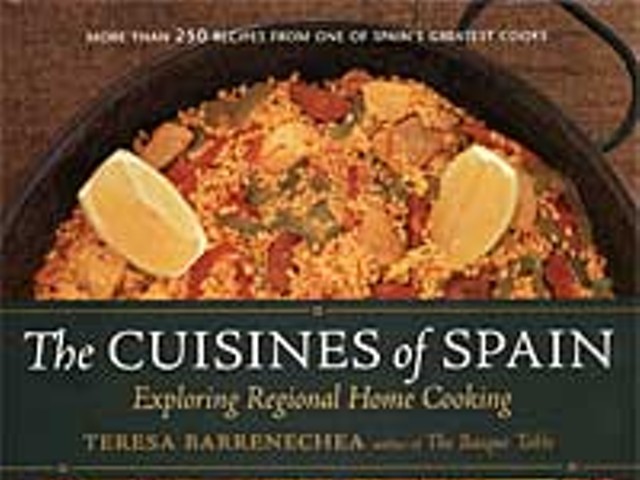If you like food as something more than sustenance, then you find it — and all related topics — almost endlessly fascinating. You read cookbooks, actually read them, just as you would any good novel or (you should excuse the expression) memoir.
Grocery shopping is more often a pleasure than a chore, and you pitched a bitch back when your cable provider was a little tardy getting the Food Channel. You eat meat — and I mean no offense to our veg-head fellow travelers — because complete food freaks don't limit their range in looking for something new.
You're as happy in a kitchenware store as you are in a hardware store, and you render fat into lard or go through the labor-intensive process of making your own demi-glace just because you want to know how it works.
I'm writing for you, and by now you've noticed that we've more than doubled the space for Metro Times' food coverage. There's way more to food than critiquing places to eat out, and now we can explore some of it.
We'll be adding new voices to our restaurant reviews, a space for food news, and briefs on a noteworthy food book (Eat the Page), A Tasty Beverage, and a kitchen gadget that delivers on its promise — all of which will appear every week.
This column will appear twice monthly, alternating with restaurant listings and an interview with someone doing something interesting in the food world. There'll now be a weekly slot for answering your questions about anything food-related — Ask the Food Dude. And the section will close with Spit or Swallow? — a short look at some of the peculiar things people eat, and why.
But, you say, what do you know about food, dude? Fair question. I'll give you the background, then you can decide.
I've been studying it, intrigued, since I cracked Mom's ring-bound Betty Crocker Cookbook pretty early in my life, which is now on the down slope of a half-century. Starting at the front, the position commonly held by eggs in general-purpose cookbooks, I was amazed how many ways there were to cook something so simple. My mother was an exceptional cook, coming from solid farm stock, people who knew how to make the best of simple ingredients. But she never shirred eggs, rarely poached them, certainly never served them with a sauce or en gelee. So I set out to cook each of the egg dishes and, before too long, I did — with all the predictable disasters that can be expected with a kid in the kitchen. That was the beginning of an abiding pleasure: cooking.
Then came the discovery of Julia Child, the "Galloping Gourmet" Graham Kerr — "First, you take a leek ... then flop your breasts into the pan" — and the civil engineer/Cajun cook, Justin Wilson. I watched their TV shows, bought their cookbooks and found how many paths stray away from meat-and-potatoes.
When I went to work as a newspaper reporter, it was as a hard news guy with no thought of ever writing about grub. The first "food writing" I did was an investigative series for The Detroit News that documented the waste of more than 250 tons of federal surplus food for the poor under a program run by Mayor Coleman Young's "social companion."
Then came the now-croaked Detroit Monthly magazine, where I was hired to do news features and investigations. One day, the editor, remembering that food and restaurant coverage was by far the first reason readers picked us up, decided that task should be handled by a staffer, not outside help. "You've always screwed around with food, haven't you?" he asked me. "It's yours if you want it." The hook, and I think there usually is one with a good thing, was that it was on top of my existing work, and it's been that way since.
At the same time, I got a side gig with WDIV as a newspaper critic, first in the country they told me, and then they added food and restaurant features — a side job to a side job. This went on for several years, during which nearly any comment I got about that work focused on the food segments. That's when I knew that either the rest was unremarkable — possible, if not likely — or food definitely was big with metro Detroit.
During most of the first nine years of HOUR magazine, I handled the food coverage although — just as now — I had more than enough to do as editor. But it's mostly a reliable pleasure. In that time, I started to teach cooking on the adjunct faculty of Henry Ford Community College. It was labor-intensive but mostly fun, and led to a teaching gig with Operation Frontline, an offshoot of the Save Our Strength restaurant charity. I taught recovering drunks and junkies at a halfway house how to cook and make the most of a food buck — the street beat meets the eats beat.
I've only had one bit of formal training, a game-cooking course with Michigan's first certified master chef, Milos Cihelka, now referred to by an extraordinary number of our area's best chefs as "the Godfather," for his influence on them. In the first class, we walked in to see an entire deer, field-dressed only, hanging from a meat hook. Before that evening was over, Chef Milos skinned and butchered the deer by hand, lecturing happily all the while, and served it as the entrée in a dinner for about two dozen of us.
I now own about 300 cookbooks, many of them as a reviewer. I've eaten on four continents, including taco meat out of a plastic pail during the 1985 Mexico City earthquakes, Nile River perch and couscous in Africa, reindeer carpaccio in Sweden, candied toasted grasshoppers and Hiroshima oysters — best ever — in Japan, and veal tenderloin with bone marrow at a three-star Michelin restaurant in Lyons, France, with Coleman Young, a jovial and endlessly interesting dining companion.
It's added up and, among other things, food is what I do, dude. Now, off to have a fried egg sammich, and maybe a Little Debbie snack cake.
Ask the Food Dude
Q: I can hardly bear the shrieking of a live lobster when I plunge it into boiling water for a tasty meal. Then it clacks against the pot lid, knocking it off and seeming to beg for a pardon. I eat it anyway, but shed at least one tear of respect for the beast that paid the ultimate price so I could enjoy its tender, sweet flesh dripping with drawn butter and a little lemon juice. Can you offer any reassurance, or must I face up to the difficult realities of life at the top of the food chain?
A: First, lobsters don't "shriek." That sound you hear is steam whistling from under the lobster's shell as the moisture there turns to steam. And since they have the nervous system of a bug, you should shed no more tears for this delicious creature than you would for the cockroach you happily crush under a boot heel. If the whistle and fuss still bother you, try dunking the lobster in lukewarm water for a few minutes. It'll relax, doze off and go gently into that good night.
Q: I always overdo my pork. What’s the best way to avoid dry, tasteless meat?
A: By far the easiest and most reliable way to avoid turning pork, beef, chicken and many other meals-in-the-making into something with the taste and texture of ceiling insulation is to lay down a few bucks for a digital food thermometer. Bear in mind that, not caring how your food tastes, the government plays CYA with its recommended temps. Back off from them about 5 degrees, let your meat rest on the counter for 15 or 20 minutes, and see if I'm not right.
Spit or swallow
The age-old desire of many cultures to find food or drink that provides what’s euphemistically referred to as “stamina” — sometimes underscored by a raised fist on a stiff arm — has led to the gulping of some pretty weird stuff. Demand grows, prices rise, and the sources of the reputed love elixirs begin the disappear. The seahorse, once a curious staple of pet shop aquariums, is one of the latest to be threatened. Tour Chinatown in Chicago, Toronto or San Fran and you'll see them for sale, dried, fried, ready to be eaten as is or ground into powder. In one ritual, lovers drops a pair of seahorses in a glass of wine, then down the whole thing in an erotic version of "eating the worm." Scientists think AIDS jumped species when humans ate monkey meat; SARS from chowing on civet cats. Those who gulp seahorses might keep this in mind: The male bears the babies.
Ric Bohy is editor of Metro Times. Send comments, questions and tidbits to [email protected]




